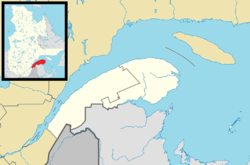Percé
| Percé | ||
|---|---|---|
| City | ||

The village and the famous Percé Rock, from nearby Mont-Sainte-Anne.
|
||
|
||
 Location within Le Rocher-Percé RCM. |
||
| Location in eastern Quebec. | ||
| Coordinates: 48°32′N 64°13′W / 48.533°N 64.217°WCoordinates: 48°32′N 64°13′W / 48.533°N 64.217°W | ||
| Country |
|
|
| Province |
|
|
| Region | Gaspésie–Îles-de-la-Madeleine | |
| RCM | Le Rocher-Percé | |
| Settled | 1800s | |
| Constituted | January 1, 1971 | |
| Government | ||
| • Mayor | André Boudreau | |
| • Federal riding | Gaspésie—Îles-de-la-Madeleine | |
| • Prov. riding | Gaspé | |
| Area | ||
| • Total | 550.30 km2 (212.47 sq mi) | |
| • Land | 432.39 km2 (166.95 sq mi) | |
| Population (2011) | ||
| • Total | 3,312 | |
| • Density | 7.7/km2 (20/sq mi) | |
| • Pop 2006-2011 |
|
|
| • Dwellings | 1,907 | |
| Time zone | EST (UTC−5) | |
| • Summer (DST) | EDT (UTC−4) | |
| Postal code(s) | G0C 2L0 | |
| Area code(s) | 418 and 581 | |
| Highways |
|
|
| Website | www |
|
Percé is a small city near the tip of the Gaspé Peninsula in Quebec, Canada. Within the territory of the city there is a village community also called Percé.
Percé, member of the association of Most Beautiful Villages of Quebec, is mainly a tourist location particularly well known for the attractions of Percé Rock and Bonaventure Island.
In addition to Percé itself, the town's territory also includes the communities of Barachois, Belle-Anse, Bougainville, Bridgeville, Cap-d'Espoir, Cannes-de-Roches, Coin-du-Banc, L'Anse-à-Beaufils, Pointe-Saint-Pierre, Rameau, Saint-Georges-de-Malbaie, and Val-d'Espoir.
Percé is the seat of the judicial district of Gaspé.
The area was within the traditional homelands of the Mi'kmaq people, who called the place Sigsôg ("steep rocks" or "crags") and Pelseg ("fishing place"). In 1603, Samuel de Champlain visited the area and named the famous rock Isle Percée ("Pierced Island"). During the 17th century, the place was used primarily as a stop-over for ships travelling to Quebec.
Used as a seasonal fishing centre during the New France era, permanent settlement began in the early 19th century with the arrival of Irish, French Canadian, and Jersey natives. In 1801 the Parish of Saint-Michel-de-Percé was founded. Percé became the most important fishing location on the Gaspé Peninsula after Charles Robin, a native of Jersey, began his fishing establishment. Old buildings of the Charles Robin Company can still be seen there.
In 1842, the geographic township of Percé was formed, and 3 years later, the place was incorporated as a township municipality.
In 1942, the Royal Canadian Navy made a decision to expand Direction Finding and wireless intercept at Cap D'Espoir to a 24-hour basis in order to provide more bearings on German U-boats and to intercept enemy radio traffic. The Department of Transport placed its facilities at the disposal of the RCN. On May 21/45, the Canadian Naval Service approved the closing down and disposal of Harbour Grace and Cap D'Espoir intercept stations.
...
Wikipedia


